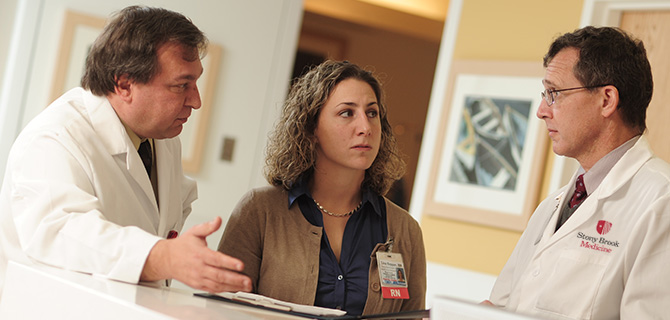Bronchoscopy allows your pulmonologist (lung specialist) to look into your airways and lungs. Bronchoscopy is used to evaluate and treat growths in the airway, diagnose and determine the extent of lung cancer, control bleeding, or remove objects blocking the airway. It can also be used to treat airway problems such as bleeding and obstruction.
There are two types of bronchoscopy: flexible or rigid. Flexible bronchoscopy is used whenever possible because it is more comfortable and does not require general anesthesia.
You may need to remove dentures, empty your bladder, and put on a hospital gown. Your heart rate, blood pressure, and oxygen level will be monitored during the procedure. You will be have an IV line (intra-venous; into a vein) placed in your arm, and receive medication to sedate (relax) you.
Prior to the placing the scope through your nose, an anesthetic ointment is given in the nose to numb your nasal passages to make you more comfortable. A local anesthetic in the form of a spray is given in your nose and mouth; this will numb your throat and reduce your gag reflex. More anesthetic is sprayed through the scope to numb your vocal cords. You may be asked to make a high-pitched sound while the scope is passed through the vocal cords.
You will not feel pain during the procedure, but you may feel pressure, or want to gag or cough. Therefore, most patients are given a mild sedative during the procedure; this will keep you comfortable even if you are not completely asleep. You may not eat or drink for about 2 hours, or until you can swallow without choking.
At 4-6 hours after the bronchoscopy, it is not uncommon to have shaking chills; this usually responds quickly to acetaminophen (Tylenol; 650 mg). A small amount of blood in your sputum is not uncommon after a biopsy. The following day you may feel tired, and have a low-grade fever, general muscle aches, or a sore throat. If you have any concerns about symptoms after a bronchoscopy, please call a physician at 631-444-2981 during business hours or 631-689-8333 on off-hours.
Results of a biopsy (tissue sample taken for analysis) may take 2-4 days to be available. As with most biopsies, a negative result does not prove that you don't have cancer. There is always the chance of a "false-negative" result-a test result that is erroneously classified in a negative category because of imperfect testing methods or procedures.
Please click here for bronchoscopy instructions.


